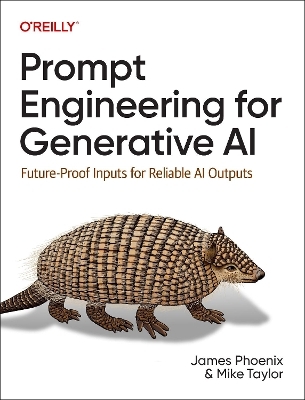
Prompt engineering for Generative AI
future-proof inputs for reliable AI outputs
Seiten
2024
|
1. Auflage
O'Reilly Media (Verlag)
978-1-0981-5343-4 (ISBN)
O'Reilly Media (Verlag)
978-1-0981-5343-4 (ISBN)
Large language models (LLMs) and diffusion models such as ChatGPT and Stable Diffusion have unprecedented potential. With this book, you'll gain a solid foundation in generative AI, including how to apply these models in practice.
Large language models (LLMs) and diffusion models such as ChatGPT and Stable Diffusion have unprecedented potential. Because they have been trained on all the public text and images on the internet, they can make useful contributions to a wide variety of tasks. And with the barrier to entry greatly reduced today, practically any developer can harness LLMs and diffusion models to tackle problems previously unsuitable for automation.
With this book, you'll gain a solid foundation in generative AI, including how to apply these models in practice. When first integrating LLMs and diffusion models into their workflows, most developers struggle to coax reliable enough results from them to use in automated systems. Authors James Phoenix and Mike Taylor show you how a set of principles called prompt engineering can enable you to work effectively with AI.
Learn how to empower AI to work for you. This book explains:
The structure of the interaction chain of your program's AI model and the fine-grained steps in between
How AI model requests arise from transforming the application problem into a document completion problem in the model training domain
The influence of LLM and diffusion model architecture-and how to best interact with it
How these principles apply in practice in the domains of natural language processing, text and image generation, and code
Large language models (LLMs) and diffusion models such as ChatGPT and Stable Diffusion have unprecedented potential. Because they have been trained on all the public text and images on the internet, they can make useful contributions to a wide variety of tasks. And with the barrier to entry greatly reduced today, practically any developer can harness LLMs and diffusion models to tackle problems previously unsuitable for automation.
With this book, you'll gain a solid foundation in generative AI, including how to apply these models in practice. When first integrating LLMs and diffusion models into their workflows, most developers struggle to coax reliable enough results from them to use in automated systems. Authors James Phoenix and Mike Taylor show you how a set of principles called prompt engineering can enable you to work effectively with AI.
Learn how to empower AI to work for you. This book explains:
The structure of the interaction chain of your program's AI model and the fine-grained steps in between
How AI model requests arise from transforming the application problem into a document completion problem in the model training domain
The influence of LLM and diffusion model architecture-and how to best interact with it
How these principles apply in practice in the domains of natural language processing, text and image generation, and code
James Phoenix has a background in building reliable data pipelines for marketing teams, including automation of thousands of recurring marketing tasks. He has taught 40+ Data Science bootcamps for General Assembly. Mike Taylor built and ran a 50-person marketing agency, including working on innovation projects with Unilever, Nestle, and Facebook. Over 300,000 people have taken his marketing courses on LinkedIn Learning.
| Erscheinungsdatum | 28.05.2024 |
|---|---|
| Reihe/Serie | Animals |
| Zusatzinfo | Illustrationen |
| Verlagsort | Sebastopol |
| Sprache | englisch |
| Maße | 178 x 233 mm |
| Einbandart | kartoniert |
| Themenwelt | Informatik ► Theorie / Studium ► Künstliche Intelligenz / Robotik |
| ISBN-10 | 1-0981-5343-X / 109815343X |
| ISBN-13 | 978-1-0981-5343-4 / 9781098153434 |
| Zustand | Neuware |
| Informationen gemäß Produktsicherheitsverordnung (GPSR) | |
| Haben Sie eine Frage zum Produkt? |
Mehr entdecken
aus dem Bereich
aus dem Bereich
Buch | Softcover (2024)
REDLINE (Verlag)
20,00 €
Eine kurze Geschichte der Informationsnetzwerke von der Steinzeit bis …
Buch | Hardcover (2024)
Penguin (Verlag)
28,00 €


